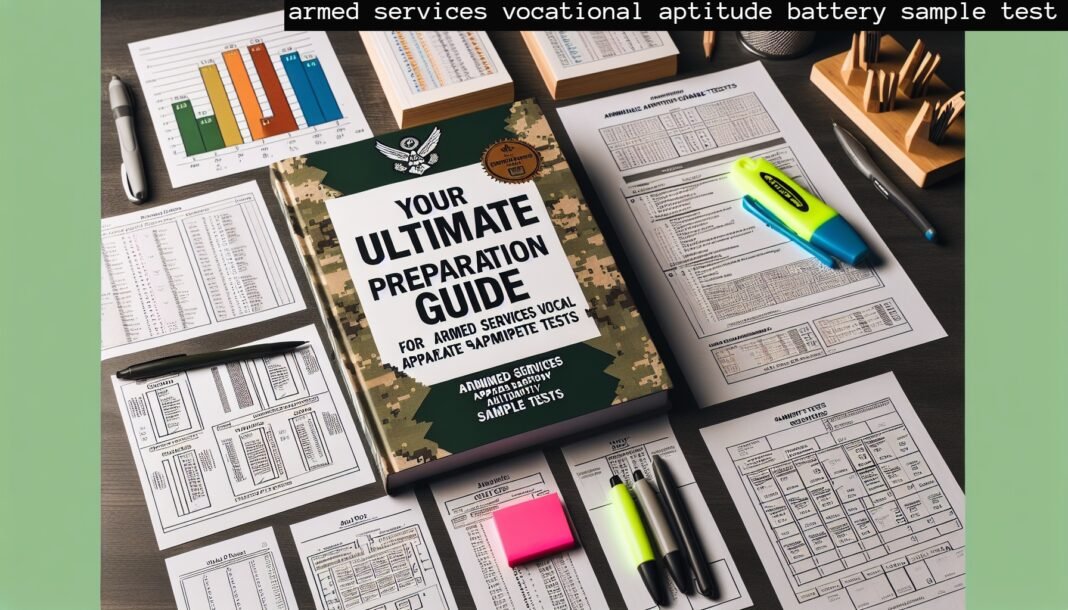The Armed Services Vocational Aptitude Battery (ASVAB) is a pivotal multiple-choice test that plays a fundamental role in military enlistment, determining qualifications for various military branches and occupations.
Achieving high scores on the ASVAB practice test online can open the door to a wider array of military career options, highlighting the significance of thorough preparation and understanding of the armed services vocational aptitude battery exam.
This guide aims to equip readers with strategies for acing the armed services vocational aptitude battery sample test, delving into ASVAB test questions and answers to ensure optimal performance.
Through effective test-taking techniques and resource utilization, candidates can significantly enhance their chances of success, turning the challenge of the ASVAB into an opportunity for career advancement in the military.
Understanding ASVAB Test Sections
Familiarization with ASVAB Subtests
- General Overview: The Armed Services Vocational Aptitude Battery (ASVAB) consists of ten distinct subtests: General Science (GS), Arithmetic Reasoning (AR), Word Knowledge (WK), Paragraph Comprehension (PC), Mathematics Knowledge (MK), Electronics Information (EI), Auto Information (AI), Shop Information (SI), Mechanical Comprehension (MC), and Assembling Objects (AO). Each subtest is designed to assess different aspects of a candidate’s abilities and potential for success in various military and civilian roles.
- Scoring System: Understanding the scoring system is crucial. The ASVAB provides three main types of scores: the Standard Scores, Composite Scores, and the Armed Forces Qualification Test (AFQT) score. The AFQT score, which is derived from the scores of four specific subtests (AR, MK, PC, WK), plays a pivotal role in determining eligibility for enlistment.
Key Scores and Their Implications
- AFQT Scores: The AFQT score is a critical component that determines enlistment eligibility. Each military branch has set minimum AFQT scores required for enlistment, which are: Army – 31, Navy – 35, Marines – 32, Air Force – 31, and Coast Guard – 40.
- Composite Scores: Beyond the AFQT, composite scores are calculated from various combinations of the ten subtests. These scores determine qualifications for specific military occupations.
Test Formats and Preparation Strategies
- Test Formats: The ASVAB is available in two formats: the Computerized Adaptive Testing ASVAB (CAT-ASVAB) and the paper-and-pencil ASVAB (P&P-ASVAB). The CAT-ASVAB dynamically adapts to the test taker’s ability level, while the P&P-ASVAB does not and requires the same pace for all test-takers.
- Preparation Tips: Familiarity with the test format and practicing with sample questions are highly recommended to enhance performance. Understanding the time limits for each section, which range from 6 to 55 minutes, is crucial for effective time management during the test.
Strategies for Tackling Sample Tests Effectively
Familiarize with ASVAB Test Format and Questions
- Understand the Test Structure: Begin by familiarizing yourself with the types of questions and the format of the ASVAB. This includes recognizing the difference between the Computerized Adaptive Testing (CAT-ASVAB) and the Paper & Pencil (P&P-ASVAB) versions. Each has distinct strategies for optimal performance.
- Practice with Sample Tests: Use official ASVAB sample tests and those available from reputable sources to practice. These tests simulate the actual exam environment and help identify your strengths and weaknesses.
Effective Study and Practice Techniques
- Early Preparation: Start preparing at least two months before the scheduled test date. This allows ample time to cover all sections without rushing.
- Targeted Practice: Concentrate on sections where improvement is needed, especially the AFQT sections, as they are crucial for military qualification.
- Regular Practice: Consistency in study habits is key. Regular practice through sample tests can boost confidence and reduce test anxiety.
Optimize Test Performance
- Time Management: During practice, focus on managing your time effectively to ensure you can answer all questions within the allotted time.
- Strategic Guessing: When unsure about an answer, use the process of elimination to narrow down choices. If time is running out, choosing the same answer for all remaining questions can sometimes increase your chances of scoring.
- Review and Learn: After each practice test, review incorrect answers to understand mistakes. This review process is critical for avoiding similar errors in the future.
Review and Analyze Your Test Results
Understanding Your ASVAB Scores
- Interpreting Percentile Scores: Your percentile score places your performance in context, comparing it to others in your age group. For example, a percentile score of 60 means you scored higher than 60% of your peers. This score is vital for understanding your relative standing and can guide your study areas for retests if needed.
- Evaluating Standard Score Bands: These scores break down your results into specific categories, showing where your strengths and weaknesses lie. Use this detailed feedback to focus your preparation on weaker areas, enhancing your overall performance for future tests.
- Assessing the AFQT Score: The Armed Forces Qualification Test (AFQT) score determines your eligibility for enlistment. Each branch of the military has specific cutoff scores. If your AFQT score is below the required threshold, consider re-taking the test or exploring different branches where your score might meet the requirements.
Exploring Career Opportunities
- Utilize the Career Exploration Guide: This tool helps translate your ASVAB scores into potential career paths. It aligns your strengths and interests with suitable roles, aiding in making informed decisions about your future career in or out of the military.
- Consider Further Education or Training: Many careers may require additional education or training beyond high school. Your ASVAB scores can help identify areas where further education could benefit your career trajectory, whether in the military or civilian sectors.
Taking Action on Your Results
- Requesting Score Reports: If you have not received your scores within 30 days, you can request them online or from the military entrance processing station where you took the test. This ensures you have the necessary information for any decisions moving forward.
- Options for Low Scores: If unsatisfied with your scores, you can retake the ASVAB after a one-month waiting period. Use this time to focus on areas of weakness identified in your score bands.
- Consulting with a Recruiter: A recruiter can offer guidance on how low AFQT scores might affect your enlistment options and what steps you can take to improve your prospects. This is particularly helpful if you are determined to pursue a career in the military.
Leveraging Resources and Study Materials
To excel in the Armed Services Vocational Aptitude Battery (ASVAB), leveraging a variety of resources and study materials is crucial. Here is a structured approach to maximize the use of these resources:
Establish a Solid Foundation
- Academic Preparation: Engage in academic and technical courses in high school or college, focusing on mathematics, English, and science to improve your performance on corresponding ASVAB subtests.
- Technical Courses: For subtests like Auto Information and Electronics Information, technical courses can provide the necessary knowledge base.
Utilize Official and Supplementary Resources
- Official Resources: Access the ASVAB CEP practice test resources and the official website for authentic practice tests.
- Supplementary Materials: Utilize additional study aids such as Kaplan ASVAB Prep books, ASVAB for Dummies, and the McGraw-Hill’s ASVAB guide. These materials offer comprehensive reviews, practice tests, and test-taking strategies.
Engage with Digital and Community Support
- Online Platforms: Register for free online classes and utilize platforms like Khan Academy and Varsity Tutors for sectional practice tests.
- Social Media and Study Groups: Join ASVAB-focused Facebook groups and forums where you can exchange study tips and resources.
- Personalized Tutoring: Consider hiring an ASVAB tutor for personalized guidance, especially if you have specific areas of weakness.
By systematically using these resources, candidates can significantly enhance their test preparation and increase their chances of achieving a high score on the ASVAB.
Conclusion
Navigating through the intricate process of preparing for the Armed Services Vocational Aptitude Battery (ASVAB) requires understanding its structure, mastering the content, and applying effective study and test-taking strategies.
Our comprehensive guide has delineated the importance of familiarizing oneself with the ASVAB’s sections, leveraging the right resources, and employing practical tips to enhance overall test performance. By adopting these approaches, candidates can significantly bolster their chances of securing scores that will open doors to varied and promising career paths within the military.
The journey towards excelling in the ASVAB is one that involves dedication, strategic preparation, and continuous learning. As we have explored, making use of available resources and tools, engaging with community support, and consistently practicing with the intent of improving can transform the formidable challenge of the ASVAB into a manageable and conquerable task.
The ultimate goal is not just to pass the test but to achieve a score that aligns with one’s career aspirations in the military, ensuring a future that is both rewarding and aligned with personal and professional objectives.
FAQs
What are effective strategies for preparing for the Armed Services Vocational Aptitude Battery (ASVAB)?
To effectively prepare for the ASVAB, begin with a practice test to identify your baseline score and pinpoint areas that may need additional focus. Establish a quiet study environment, gather necessary study materials, and create a consistent study schedule. Utilize resources like Military.com for additional practice tests and study tips.
What exactly is the Armed Services Vocational Aptitude Battery (ASVAB)?
The ASVAB is a multiple-choice test administered by the United States Military Entrance Processing Command. It is designed to assess a candidate’s suitability and potential for enlistment in the United States Armed Forces.
What is the maximum score attainable on the ASVAB?
The highest score on the ASVAB is calculated using the Armed Forces Qualification Test (AFQT), which consists of four specific subtests from the ASVAB. Scores are presented as percentiles ranging from 1 to 99.
What score is required on the ASVAB to enlist in the Air Force?
To enlist in the Air Force, candidates must achieve a minimum ASVAB score of 31 if they are a high school senior or possess a high school diploma. For those holding a GED, the required minimum score is 50.


